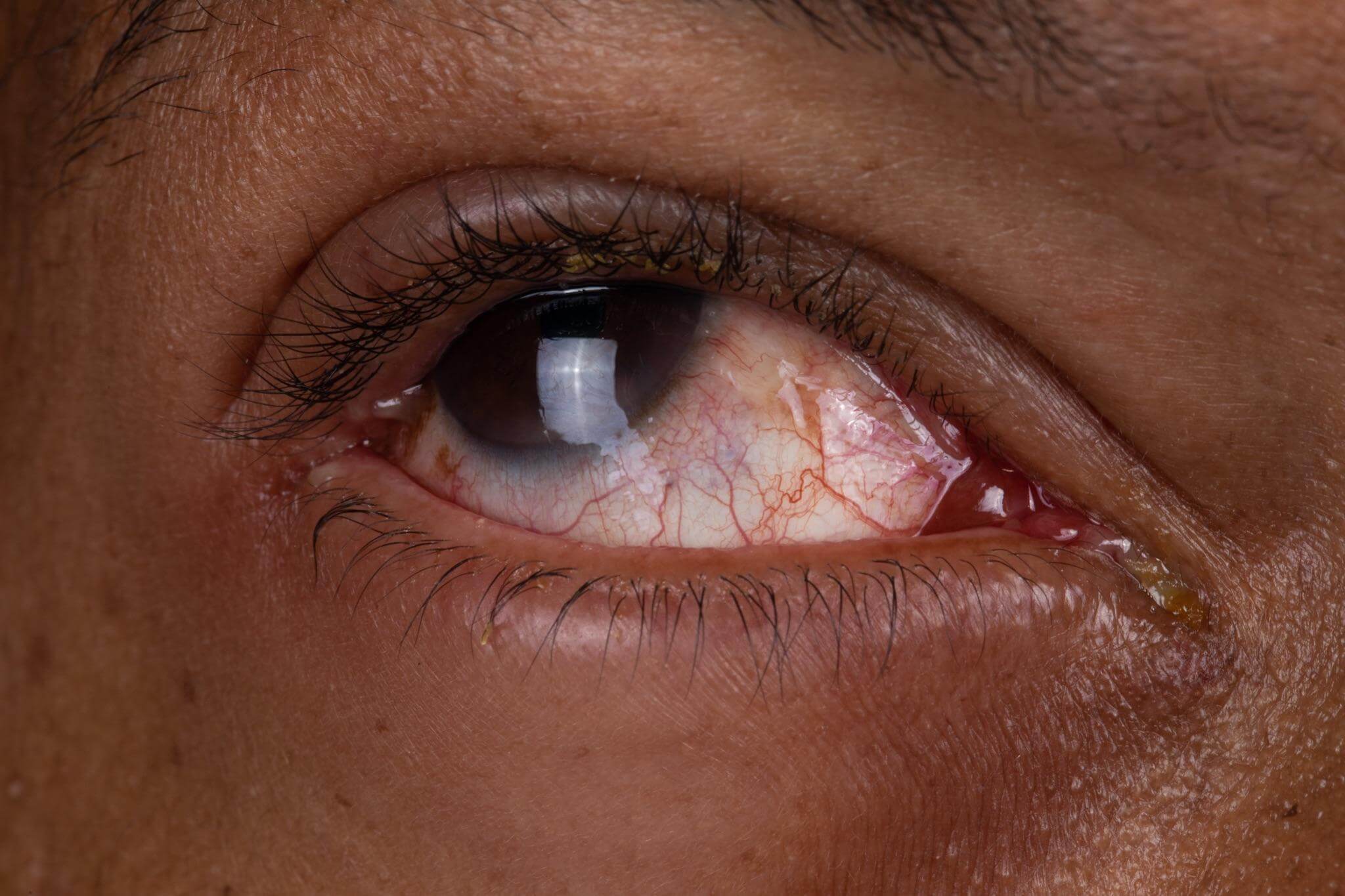You probably had conjunctivitis, or pink eye, at least once when you were a kid. Pink eye is an inflammation of the conjunctiva, a thin membrane in your eye. This inflammation turns your eyes pink, giving the condition its nickname.
Prevalence
Conjunctivitis is very common. It affects about 6 million people each year in the United States. While the condition is not serious, it generates enormous costs, upwards of $377 to $857 million per year, in treating bacterial conjunctivitis alone. About 1% of all primary care physician visits are due to pink eye. More than half of all cases present in children.
Types of Conjunctivitis
According to the CDC, there are four types of conjunctivitis:
- Bacterial
- Viral
- Allergic
- Irritant/chemical
Although they come from different causes, they present with similar symptoms. However, they do need to be treated differently.
Conjunctivitis Symptoms
Pink eye presents with several common symptoms, including:
- Pink or red-tinted eyes
- Discharge in your eyes
- Itchiness in your eyes
- Extra tears
Any of these symptoms can also be caused by other conditions, however. For example, asthma, hay fever, and the common cold can all induce the same symptoms.
Conjunctivitis Causes
Conjunctivitis happens when something gets into your eye that shouldn’t be there. That something could be bacterial, viral, allergic, or irritant/chemical.
Bacterial Conjunctivitis Causes
Bacterial conjunctivitis results from getting staphylococcal or streptococcal bacteria in your eye. This could result from sharing towels or makeup with someone or from touching your eye with an unclean hand. Bacterial pink eye usually produces more pus or mucus than the other types.
Viral Conjunctivitis Causes
Viral conjunctivitis typically comes from some sort of common cold virus entering your eye. This could happen if someone sneezes or coughs near you or you have a cold that you accidentally spread to your eye.
Allergic Conjunctivitis Causes
Allergic conjunctivitis is caused by an allergic reaction to a foreign body in your eye. Common allergic irritants are pollen, dust mites, animal dander, and cosmetic ingredients.
Irritant/Chemical Conjunctivitis Causes
This type of conjunctivitis is also caused by irritants. They can include fumes, chlorine and other chemicals, and wearing contact lenses longer than recommended.
Bacterial and viral conjunctivitis are highly contagious, but the allergic and chemical forms of pink eye can’t be spread to others.
Conjunctivitis Risk Factors
Conjunctivitis is very common. Certain lifestyle habits, like poor hygiene, can make it more likely for you to get pink eye. Rubbing eyes with unclean hands is the main culprit.
Having a weakened immune system will make it more difficult for your body to handle conjunctivitis. This could happen if you have an autoimmune disease, like HIV.

Conjunctivitis Diagnosis
A healthcare professional may diagnose you with conjunctivitis by simply looking at your eye and asking a few questions. They will want to know if you have common pink eye symptoms, like itchiness, discharge, or tears.
They will also want to find out if your symptoms are caused by a different problem, like asthma, hay fever, or a cold. To do this, they may collect a sample of your eye discharge, though this is rarely done.
Conjunctivitis Treatment
The source of the conjunctivitis determines the right course of treatment.
Bacterial Conjunctivitis Treatment
For bacterial conjunctivitis, you might be prescribed antibiotics. They may be in the form of eye drops or ointment and will remove the problem in a few days.
Viral Conjunctivitis Treatment
There is no treatment for viral conjunctivitis. Most cases are relatively harmless and will resolve on their own in 7-10 days. These cases are typically caused by the common cold. In other cases, however, the pink eye results from a more dangerous virus, like herpes simplex. For that, your doctor may prescribe antiviral medication.
Allergic Conjunctivitis Treatment
If you experience pink eye due to an allergic reaction to an irritant, your doctor may prescribe an antihistamine.
Chemical Irritant Conjunctivitis
Chemical conjunctivitis is usually treated by simply washing the eye out with a saline solution. Topical steroids are sometimes prescribed for severe cases.
Conjunctivitis Home Remedies
If your case is not severe and you wait for it to heal on its own, there are home remedies you can use to alleviate symptoms. You can use a warm compress to reduce the feeling of inflammation.
Artificial tears or lubricating eye drops can help moisten dry, itchy eyes, but don’t use “regular” eye drops, such as Visine, that are designed to treat red eyes. These can further irritate your eyes and make them feel worse.
While you are experiencing symptoms, stop wearing contact lenses and eye makeup.
Conjunctivitis Prevention
Preventing pink eye comes down to basic hygiene and avoiding getting foreign substances in your eye. The best prevention for allergic conjunctivitis is to avoid the allergen causing the problem.
For all types, wash your hands regularly, and don’t touch your eyes. Children get conjunctivitis frequently because they haven’t yet established good hygiene habits. If you have children or work with them, you will need to be more vigilant about preventing it.
If you are a technician, work in a lab, do cleaning, or otherwise handle chemicals, use safety goggles to prevent chemicals from getting into your eyes. Always have a remedy on hand, like a saline solution, to treat possible accidents. Labs should have an eye shower on site for immediate treatment.
Conjunctivitis and Covid
Although COVID-19 is still a new, relatively unstudied disease, it is known that it can cause viral conjunctivitis. This can happen if someone with COVID coughs or sneezes near your eyes, or if you have COVID and accidentally spread it to your eyes with your hands.
Interestingly, it appears that some patients have gotten COVID only in their eyes. While this is rare, it is a testament to the varied outcomes of the disease.
If you have COVID or live with someone who does, wash your hands frequently and avoid touching your eyes.

Find the Lowest Price for Conjunctivitis Medication
Although most conjunctivitis cases resolve on their own, you may need to treat yours with medication, depending on the type you have.
BidRX offers conjunctivitis medication at the lowest price available. Our mission is to invite pharmacies to come to you with their best offers on the medication you need. Find your medication and create a bid today!
